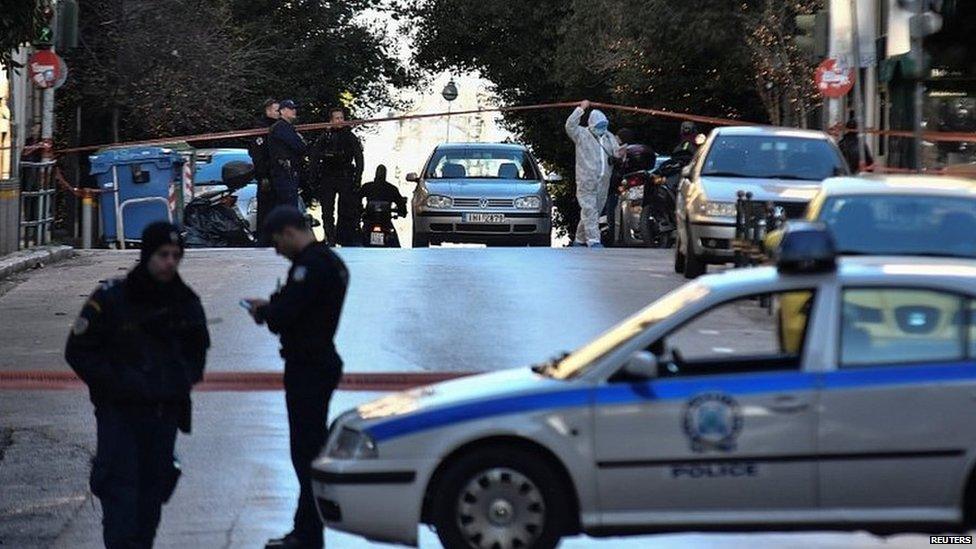No-deal Brexit could put public at risk, warns Met chief
- Published

The UK will leave Europol after Brexit and will not be a member of the European Arrest Warrant scheme
The public could be put at risk if the UK leaves the EU in March without an official agreement, the UK's most senior police officer has said.
Met Commissioner Cressida Dick said a no-deal exit would threaten access to EU-wide criminal databases and make it harder to extradite people from abroad.
She told the BBC the Met was talking to other police forces across Europe about contingency arrangements if needed.
Parliament will vote on the UK's proposed withdrawal deal next month.
The UK is due to leave the EU on 29 March 2019.
The agreement negotiated by Theresa May with the EU - which sets the terms of the UK's exit and a declaration on future relations - will only come into force if MPs approve it.
The prime minister has said she wants the UK to have the most comprehensive security partnership with the EU of any country outside the bloc.
After Brexit, the UK will cease to be a member of law enforcement agencies Europol and Eurojust, and will no longer be a member of the European Arrest Warrant scheme, which enables EU nations to fast-track the extradition of criminal suspects.
The agreement on future relations, external commits the two sides to putting in place reciprocal arrangements to try and match existing law enforcement and judicial co-operation.
The priority areas for future law enforcement co-operation include the exchange of data such as DNA, fingerprints, passenger records, wanted alerts, and vehicle registrations.
The EU needs the UK in many of these areas, but the document is not legally binding and also makes clear that there is a variety of technical issues to be overcome.
'Slower and costlier'
Ms Dick told BBC Radio 4's Today programme that the UK's policing co-operation with the EU was based on a framework of "legal instruments" which would have to be replaced after its exit.
While she hoped the two sides would end up with "something very similar", she accepted that if the UK left without a deal, this would be "very difficult to do short term".
"We will have to replace some of the things we currently use in terms of access to databases, the way in which we can quickly arrest and extradite people, these kinds of things, we'll have to replace as effectively as we can.
"That will be more costly, undoubtedly, slower, undoubtedly and, potentially, yes, put the public at risk."
Allow X content?
This article contains content provided by X. We ask for your permission before anything is loaded, as they may be using cookies and other technologies. You may want to read X’s cookie policy, external and privacy policy, external before accepting. To view this content choose ‘accept and continue’.
The Metropolitan Police, she said, was working with other UK forces to determine how best to maintain European co-operation after Brexit.
She also disclosed that she was taking to European counterparts on a country-by country basis about contingency plans needed to maintain co-operation, if this became necessary.
"We can talk about how they may happen but while so much is unknown, nothing can be put in place and it would be improper to do so," she said.
"But we can talk with our colleagues and indeed I and my senior colleagues across policing are doing that all the time."
'Mutually beneficial'
Ms Dick's comments were welcomed by opponents of Brexit, with Mayor of London Sadiq Khan saying the public should be given the final say in another referendum to stop the UK "crashing out" of the EU.
But campaign group Stand Up 4 Brexit, which opposes Mrs May's deal, said it would be "mutually beneficial" for the UK and EU to respect existing security arrangements until deciding on what replaces them.
The organisation, which says it has the backing of more than 50 Conservative MPs, said it was "very confident" that bilateral agreements could be agreed once the UK left.
"Cressida Dick accepted that they are already discussing arrangements so it can be put in place quickly," its director Rebecca Ryan said.
The Home Office said it had proposed an ambitious and legally-binding agreement on internal security as part of the withdrawal deal but the UK had to be prepared for all eventualities.
"The Home Office is working intensively with operational partners and others to ensure we are ready to make best use of the alternative channels with member states, should we exit without a deal," a spokesperson said, adding that the National Police Chiefs' Council was working with individual UK forces on how to manage this.
In the BBC interview, Ms Dick also defended the police response to the drone disruption at Gatwick Airport, which shut the UK's second largest airport for more than 36 hours last week and ruined the Christmas plans of thousands of holidaymakers.
She said the Met was supporting Sussex Police in investigating what was a "serious crime" and suggested whoever was ultimately found to be responsible would "undoubtedly face a prison sentence".
The authorities faced a "difficult challenge" in working out what had happened and there would have to be much closer working between the private sector and the military to ensure there was no repeat.
